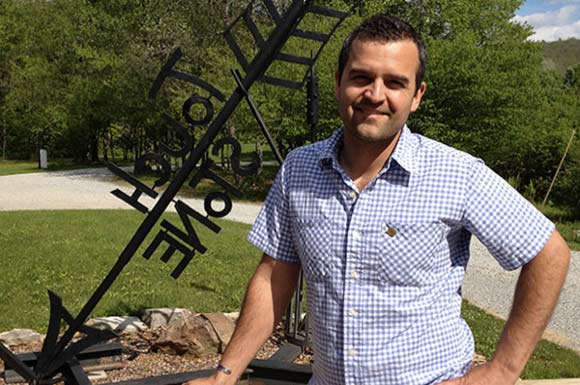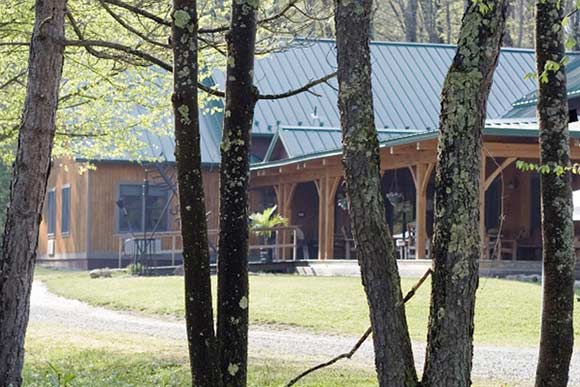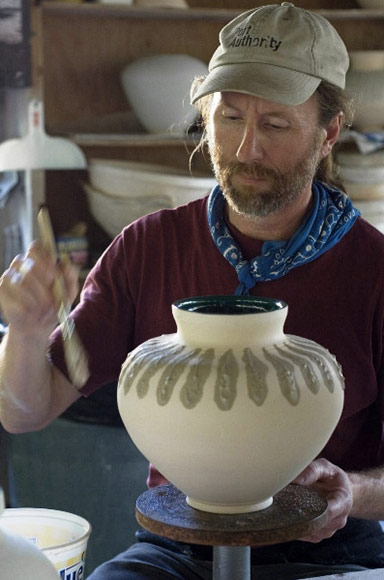Down a long and winding road deep in the Laurel Highlands sits Touchstone Center for Crafts, a residential craft school in Farmington, Pennsylvania. A collection of low-slung buildings amid tall trees and gently sloping hills, the 150-acre campus is traversed by McIntire Run, a rushing stream, and graced by Blarney Lodge, a building whose stone chimney, wood beams and floor-to-ceiling glass are at the heart of campus life.
Week-long and weekend classes are taught in nearly a dozen disciplines including ceramics, glass, and jewelry and metalsmithing, and teachers are nationally-acclaimed artists themselves.
So, why isn't the world, or at least the region, beating a path to its door?
“It takes a special skill set to run an arts and culture nonprofit,” laughs Adam Kenney, executive director of Touchstone. Kenney joined the school two years ago, when he launched a marketing campaign to tell the story of the decades-old school that had evolved while no one was looking. “This school has everything an international craft school has but it's just not packaged that way.”
Touchstone was formed in 1972 as the Pioneer Crafts Council, a place whose mission was “the preservation of craft forms in the materially- and culturally-rich Appalachian region.” These traditional forms included blacksmithing, quilting, woodworking, printing and anything else the pioneers did to carve life out of the wilderness.
In 1982, the school's mission expanded to the preservation of traditional to contemporary and emerging craft forms. If blacksmithing was the old, polymer clay was the new and ceramicists were encouraged to move from traditional pots to cutting-edge figurative and sculptural forms.
“There aren't a lot of places like Touchstone in the country,” says Kenney, who believes the school should be the same conversation as other highly regarded craft schools including Penland in the Blue Ridge Mountains of Asheville, North Carolina, the Pilchuk Glass School near Seattle, and the Haystack Mountain School of Crafts in Deer Isle, Maine.
What Touchstone has that these other schools do not is the best geography in the genre thanks to a location that's close to large population areas in the Mid-Atlantic, Northeast and Midwest. Even so, it's been a heavy lift to get students to turn out in numbers, probably because they don't even know Touchstone exists.
“We attract everyone from the curious novice to the passionate amateur,” continues Kenney, “and we also facilitate workshops for professionals. This is a high-quality entry point for the public to develop a relationship with craft forms.”
Many classes are at the beginner and intermediate levels and while weekday classes run from 9 a.m.-5 p.m., the residential nature of the school means that most students will be back in the studio late into the evening.
“It's an absolutely immersive experience that you will not get anywhere else in the state. The flow you get here, you can't get anywhere else, and not at a community college,” says Kenney.
Touring the campus is an indoor-outdoor experience amid trees and wildflowers. A ceramics studio buzzes with activity and several kilns are employed, including a new Noborigama kiln perched on an outdoor slope. Artists painting and drawing in Touchstone's art studio get a plein air vibe in a glass and wood setting that's flooded with light.
“This is an art class with a naturalistic and meditative component,” notes Kenney. “It's not gonna happen anywhere else.” Pittsburgh-based jewelry designer Sharon Massey is in a blacksmithing class amid foreboding (and sooty) equipment. “I just want to start working bigger, making bigger pieces and not just sculptural jewelry,” she says.
At the heart of it all is “the ship,” a dining room on land whose design harkens to the high seas and which is staffed by ex-pats from Nemacolin's fine dining operation. A glass of wine on the ship's porch is not an uncommon sight at the end of the day, the verdant setting providing ample opportunity for reflection. Well past sundown, simple dorm rooms provide the rest.
“All of these artisans eat and share at Touchstone,” says Kenney. “There's lots of cross-pollination and things germinate in this state. Our teacher-student ratio is often 2:1 or 3:1 and the worst it could be is 10:1. We're doing transformative audience development and actively trying to get the word out. Now, we just need the right people to get excited about Touchstone.”
Kenney is clearly the man for the job. His enthusiasm for Touchstone is palpable as he zips around the campus, a rapid gait accompanied by words tumbling out of his mouth. Brooklyn born, the executive director worked as a professional glass blower before graduating from the arts management program at Carnegie Mellon and then landing at the school.
It's a big job and his days, understandably, are full. “I'm working with national artists, doing educational outreach and audience development but I come outside to get perspective. It's all about customer service, and we can't afford to lose anybody. We focus on all aspects of the experience and I take a 360-degree approach.” The school has even joined the Twitterverse @Touchstone1972.
On a recent evening, the Uniontown Art Club is hosting a show, with a parallel show also under way titled “Clearly Trapped: The Sculptural Terrariums of Lindsay O'Leary.” O'Leary's name is well known to the Pittsburgh arts community as she spent several years at the Mattress Factory. Her delicate orbs of blown glass are filled with tiny figures in set vignettes imbued with a “Mad Men” sensibility. The evening, free and open to the public, is enhanced by live jazz and a mouth-watering buffet and is one of several such events over the course of the summer.
“Everything around us or in our living spaces is mass-produced,” says Kenney. “Everything here has a subtext. Imagine living in a home where everything was made by neighbors. Luckily, America is going that way – look at the farm-to-table movement. It makes a difference.”
Touchstone's schedule of events and workshops can be found at touchstonecrafts.org.
ELAINE LABALME is a contributing editor to sister publication Pop City. Send feedback here.

Fayette County Craft School Could Be the Most Amazing Place to Create in Pennsylvania
↑ Top



